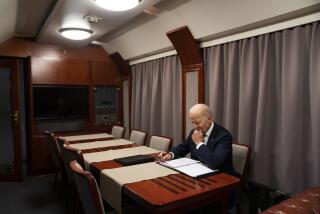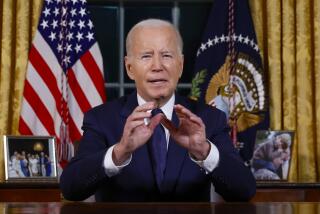Keep Iraq Above Politics
- Share via
In the coming months, President George W. Bush and Sen. John F. Kerry will disagree about many critical national security issues, including the timing of the decision to go to war with Iraq and the effectiveness of our efforts since major combat ended.
But no matter how much they differ over past decisions, they must not lose sight of our critical national interests in postwar Iraq in the years ahead. Election-year politics must not be allowed to jeopardize the U.S. commitment to security and reconstruction.
The fact is the United States has no alternative to remaining deeply engaged in Iraq. Failure to do so would ensure continued civil conflict and risk intervention and competition for influence among Iraq’s neighbors. It could lead to long-term instability in the production and supply of oil as well as the emergence of a failed state that could offer a haven to terrorists.
Disengagement from Iraq would also represent a monumental policy failure for the United States, with an attendant loss of U.S. credibility, power and influence in the region and the world.
The recent Iraqi adoption of interim laws to guide the transition period leading to a permanent constitution was a victory for both American policy and the Iraqi people, but Iraq is now entering a difficult transition period when U.S. support will be crucial.
Some might contend that there is already a strong consensus among American political leaders and the public for a long-term U.S. commitment. Indeed, in September of last year, Bush submitted an $87-billion aid request for Iraq and Afghanistan, and he has described building democracy in Iraq as a “massive and difficult undertaking” that is “worth our effort [and] sacrifice.” In addition, polling data has generally indicated support among the American public for continued U.S. involvement in Iraq.
But this public support is broader than it is deep.
In a nationwide poll taken in November 2003 by the Washington-based Program on International Policy Attitudes, 60% of respondents said that the process of creating an Iraqi government was going too slowly.
And although more than 60% indicated that they thought the United States should not withdraw troops until an Iraqi government had been elected, that figure was down 14 percentage points from an earlier poll.
Moreover, the debate over weapons of mass destruction in Iraq seems to have persuaded some Americans that it was a mistake to have gone to war -- and is also likely to affect public views about persevering in the postwar period.
In a February ABC/Washington Post Poll, respondents indicated by a 50% to 48% margin that they did not think the war had been worth fighting, down from an approval rating for the war of 70% in April 2003.
This shift in public perceptions has been accompanied by official measures that have raised questions -- most significantly in Iraqi minds -- regarding the U.S. determination to persevere. The most important of these developments was the Bush administration’s decision to accelerate the political transition in Iraq and to move up the transfer of sovereignty to June 30.
American officials have stated that the decision was designed to respond to demands by Iraqis for the restoration of indigenous authority. At the same time, Iraqis and others have speculated that the move is the first stage of a phase-out of U.S. involvement, and these fears have been compounded by reports that U.S. commanders have ordered reductions in the presence of U.S. troops in Baghdad.
It is crucial that Iraqis have confidence that the United States truly intends to stay the course. If we fail to make that case effectively, we will weaken already tenuous democratic forces and embolden those in Iraq who seek to foment chaos and instability.
Moreover, it is critical that the shift in the perceptions of the American public not create a momentum for withdrawal during this election year.
The presidential candidates need to rise above partisanship and lead on this issue.
Bush and Kerry must reaffirm their willingness to sustain our financial and military commitment and to enhance the American performance on important security, political and economic assistance issues in the months and years ahead. In so doing, the United States will sustain its vital national security interests and keep faith with the Iraqi people.
More to Read
Sign up for Essential California
The most important California stories and recommendations in your inbox every morning.
You may occasionally receive promotional content from the Los Angeles Times.










